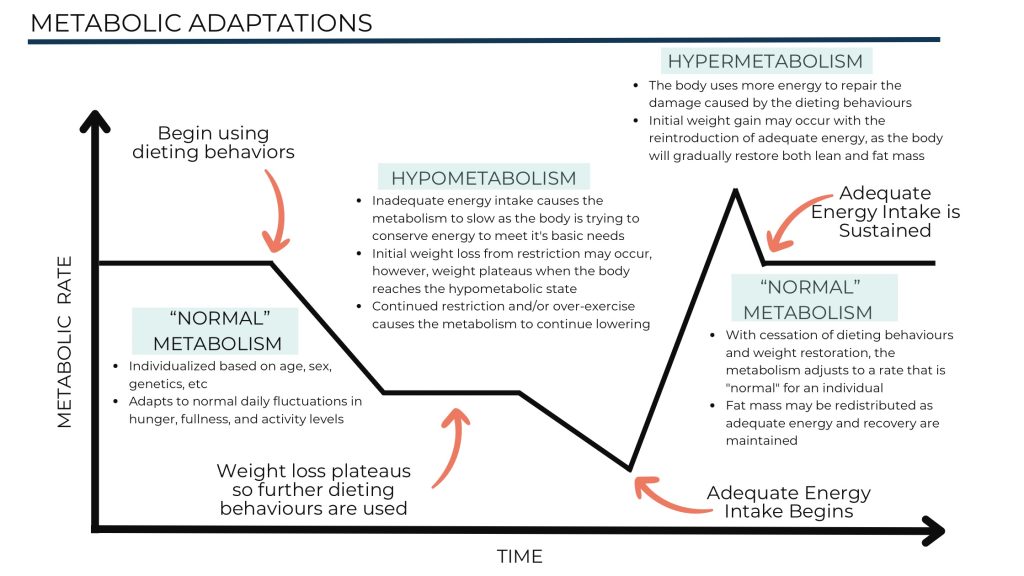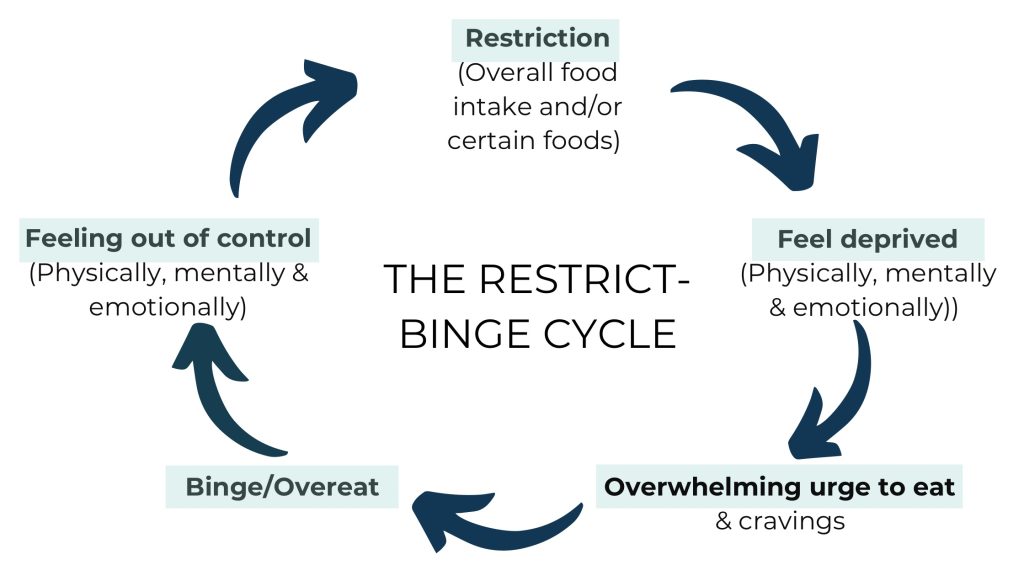Everywhere we turn, diet culture seems to follow. From social media to advertisements, even our loved ones can’t help but push the latest trends. While you may have heard about the many supposed benefits of dieting, it’s also important to consider the potential disadvantages of dieting.
Dieting often comes with a range of restrictions that can negatively impact your overall health. Reduced muscle mass, slower metabolism, nutritional deficiencies, and mental health implications are just some of the consequences of dieting.
In this article, we explore the disadvantages of dieting in greater detail and how to stop.
Hey, I’m Jenn, a Registered Dietitian who has a passion for helping individuals fuel, think, and move towards the best versions of themselves without sacrificing their relationship with food. If you want practical, evidence-based nutrition advice to improve your performance and wellness — Learn how I can help.
Let’s dive in…
What is Dieting
Dieting is when an individual attempts to lose weight by limiting and restricting the amount or types of foods and drinks they consume.
What do we mean when we say dieting?
Please note that when discussing diets, I am not referring to medically recommended diets such as cardiac diets, diabetic diets, renal diets, low FODMAP diets, etc. These diets are prescribed by a physician or dietitian for specific medical purposes.
What I am referring to are diets that prohibit, eliminate, or restrict certain foods for non-medical reasons. These diets often make unrealistic promises like “Lose X pounds in Y weeks” or “Feel healthier than ever by eliminating _____ food.” Some popular diets include WW, Keto, Octavia, Paleo, Whole 30, Noom, Intermittent Fasting, low carb, counting calories, counting macros, and more.
What are the disadvantages of dieting
Dieting can slow your metabolism
Frequently starting and stopping diets, known as chronic dieting, can actually lead to a slower metabolism.
When we lose weight or restrict calories, our bodies activate survival mechanisms. If sustained energy deficits are encountered due to restricted calorie intake, the body will make adjustments to conserve energy. This can lead to a reduction in metabolism over time, which makes weight loss more challenging as the body becomes more adept at preserving fat stores.
This often results in the frustrating weight plateau that many people experience, which leads to additional dieting measures and further metabolic decline.

One reason why metabolism slows down during dieting is due to the loss of muscle mass. Let’s discuss this more.
Dieting impacts muscle mass
Despite common misconceptions, dieting doesn’t just burn fat; it also breaks down muscle to use as energy for the body.
During the first few days of dieting, the body uses up its glycogen stores. These stores are a form of glucose storage from carbohydrates. Once depleted, the body starts to break down fat to produce the energy it needs to function.
However, some tissues like the brain cannot use fat for energy. To compensate, the body breaks down muscles and converts protein into glucose for energy.
Unfortunately, this leads to a loss of muscle mass, which can slow down the metabolism and cause weight regain after weight loss.
Dieting can lead to nutritional deficiencies
One major disadvantage of dieting is the potential risk of nutritional deficiencies.
When following restrictive diets, certain food groups may be eliminated or calorie intake severely restricted. This can lead to inadequate consumption of crucial nutrients such as vitamins, minerals, and macronutrients (carbohydrates, proteins, fats).
Any imbalances in nutrient intake may negatively affect overall health and compromise bodily functions.
Dieting can increase cravings and leave you feeling out of control around food
When you restrict food, your body is smart and responds by telling you to eat more. In fact, studies have found that dieters report experiencing more food cravings than non dieters.
Why do cravings happen?
When we follow strict food rules that limit certain foods, our brains often react by craving them even more. Unfortunately, this strategy of restricting total food intake and/or specific foods often leaves us feeling out of control and overwhelmed. It can make food seem like a source of chaos in our lives. When we give in to our cravings and indulge in a “cheat” meal, we tend to binge, which only leads to more feelings of being out of control, restricting foods, and starting the cycle all over again. This frustrating pattern is known as the restrict-binge cycle.

Providing our bodies with enough fuel is crucial for proper and efficient functioning. If you’re following a low-carb diet, your body may crave simple carbs like chocolate or ice cream. This can be a sign that your carb intake is not sufficient, and that you need to consume more complex carbs, such as whole grains, to meet your body’s needs.
Dieting leads to an all or nothing mentality
Diets typical labeling of foods as “good” or “bad” and “allowed” or “not allowed” encourages a limited and restrictive outlook on eating. This often results in losing control and binging on the “forbidden” foods, followed by feelings of failure and the promise to do better next time.
The diet cycle creates an imbalance in food making it impossible to find the balance to enjoy food and nourish yourself with food.
Dieting can take a toll on your mental health
Engaging in strict diets can take a toll on mental wellbeing as well. Constantly monitoring food choices and restricting oneself from favorite foods may lead to feelings of deprivation or guilt if one deviates from the plan occasionally – potentially resulting in disordered eating habits or even eating disorders like orthorexia or binge eating disorder.
The psychological stress associated with dieting can also lead to mood swings, irritability, and increased food cravings.
Dieting negatively impacts your body image
The pressure to conform to certain body sizes can lead to unrealistic goals and standards that can be damaging to one’s self-esteem and body image.
People are often misled to believe that being a particular size is the ultimate determinant of good health. This notion is not only unrealistic but also harmful, as it can lead to unhealthy body image and low self-esteem.
It’s important to understand that body size is not necessarily an indicator of good health. Poor diet, unhealthy lifestyle, and lack of physical activity are the real risk factors that can compromise one’s health, regardless of their body size.
Dieting is a quick fix or short term solution
Numerous diets are advertised as fast and easy ways to shed pounds, but they often fall short of their promises. These diets are marketed as an instant fix for weight loss or change, but maintaining the outcomes of a restrictive diet can be challenging in the long run.
The strict regimens can be hard to sustain indefinitely, causing people to revert to old habits and regain lost weight. Research has shown that only 25% of people are able to maintain weight loss over a long period of time after dieting.
How to Stop Dieting
Now that you’re aware of the disadvantages of dieting and believe it’s not a suitable long-term solution, you may be wondering what other alternatives exist.
Intuitive eating is an evidence-based approach to self-care, health, and body acceptance. It encourages you to foster a positive connection with yourself, food, and exercise, promoting a healthier lifestyle overall.
Breaking free from the cycle of dieting can be a challenge, but with the right support and guidance from a professional, it is definitely achievable. Along the way, there will be bumps in the road that you’ll need help navigating, and that’s okay.
As a dietitian, my goal is to support individuals in fuel, think, and move to the best version of themselves. I help individuals say goodbye to the rigid, restrictive, and stressful rules of diet culture and embrace a healthier, happier, and balanced lifestyle.
Final Thoughts
Dieting can negatively affect both your physical and mental well-being, all while damaging your self-esteem. Fortunately, it’s never too late to break free from diet culture and put an end to dieting for good.
Eating intuitively can help you fuel, think, and move towards a healthier, happier, and balanced lifestyle. You will be able to eat food without guilt or shame while listening to your body’s signals and eating for pleasure and nourishment. All while feeling empowered and in control of your choices and actions.
Ready to ditch dieting and fuel, think, and move to a better you? Schedule a free 15 minute call today!
Jenn Fink is a licensed and board-certified Registered Dietitian Nutritionist based in Minnesota. Her goal is to help busy people and families prioritize their health by living a balanced lifestyle and feed their families flavorful meals without spending hours in the kitchen. Jenn is passionate about all things food-related and enjoys making complex science easy to understand for her clients and readers.


Thank you so much for this post! For all the graph i think is really greatly explaining the metabolism (and its restoration) in a simple way.